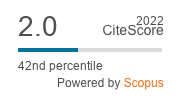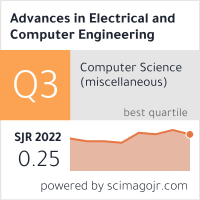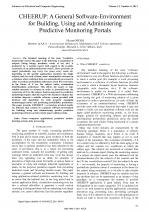| 4/2011 - 10 |
CHEERUP: A General Software-Environment for Building, Using and Administering Predictive Monitoring PortalsMUSSI, S. |
| View the paper record and citations in |
| Click to see author's profile in |
| Download PDF |
Author keywords
computer applications, predictive models, learning systems, data processing
References keywords
monitoring(13), predictive(11), manufacturing(6), technology(5), systems(4)
Blue keywords are present in both the references section and the paper title.
About this article
Date of Publication: 2011-11-30
Volume 11, Issue 4, Year 2011, On page(s): 63 - 70
ISSN: 1582-7445, e-ISSN: 1844-7600
Digital Object Identifier: 10.4316/AECE.2011.04010
Web of Science Accession Number: 000297764500010
SCOPUS ID: 84856597875
Abstract
The intended meaning of the term predictive monitoring used in the paper is the following. A population of subjects (living beings, machines, works of art, etc.) is monitored by a domain expert with regard to the possible occurrence of an undesired/desired event E. More precisely, an expert periodically (e.g. every two years, every week, etc. depending on the specific application) examines the single subjects and, for each of them, enters examination outcomes in a database where statistical data are automatically processed in order to produce probabilistic inferences about the occurrence in the future of E for the subject under examination (individualized prediction). This allows the expert to take suitable measures in advance in order to prevent/favour the occurrence of E for the subject. Such an approach to predictive monitoring requires that the expert who monitors subjects has at his/her disposal a suitable software system provided with database and algorithms for both properly managing monitoring-processes and producing probabilistic predictions. The paper presents CHEERUP : a prototype product, usable via Internet, that consists in a general software-environment for building, using and administering specific predictive monitoring software-systems (in the paper called portals). |
| References | | | Cited By |
Web of Science® Times Cited: 2 [View]
View record in Web of Science® [View]
View Related Records® [View]
Updated today
SCOPUS® Times Cited: 2
View record in SCOPUS® [Free preview]
View citations in SCOPUS® [Free preview]
There are no citing papers in the CrossRef Cited-by Linking system.
Disclaimer: All information displayed above was retrieved by using remote connections to respective databases. For the best user experience, we update all data by using background processes, and use caches in order to reduce the load on the servers we retrieve the information from. As we have no control on the availability of the database servers and sometimes the Internet connectivity may be affected, we do not guarantee the information is correct or complete. For the most accurate data, please always consult the database sites directly. Some external links require authentication or an institutional subscription.
Web of Science® is a registered trademark of Clarivate Analytics, Scopus® is a registered trademark of Elsevier B.V., other product names, company names, brand names, trademarks and logos are the property of their respective owners.
Faculty of Electrical Engineering and Computer Science
Stefan cel Mare University of Suceava, Romania
All rights reserved: Advances in Electrical and Computer Engineering is a registered trademark of the Stefan cel Mare University of Suceava. No part of this publication may be reproduced, stored in a retrieval system, photocopied, recorded or archived, without the written permission from the Editor. When authors submit their papers for publication, they agree that the copyright for their article be transferred to the Faculty of Electrical Engineering and Computer Science, Stefan cel Mare University of Suceava, Romania, if and only if the articles are accepted for publication. The copyright covers the exclusive rights to reproduce and distribute the article, including reprints and translations.
Permission for other use: The copyright owner's consent does not extend to copying for general distribution, for promotion, for creating new works, or for resale. Specific written permission must be obtained from the Editor for such copying. Direct linking to files hosted on this website is strictly prohibited.
Disclaimer: Whilst every effort is made by the publishers and editorial board to see that no inaccurate or misleading data, opinions or statements appear in this journal, they wish to make it clear that all information and opinions formulated in the articles, as well as linguistic accuracy, are the sole responsibility of the author.





